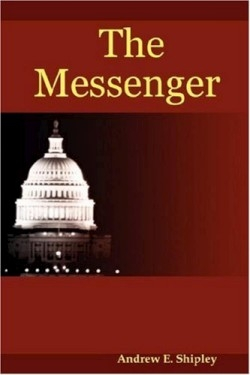The Messenger
Separation between church and state is an accepted interpretation of the United States Constitution yet most American politicians claim God to be on their side. The national population accepts this even welcoming religious faith as a sign of personal integrity; after all according to a 2007 Newsweek survey 90 of Americans themselves believe in God. Andrew E. Shipley’s novel The Messenger ponders the disastrous events that could happen when the line between religion and politics fades completely away leaving Washington D.C. a battleground on which good and evil fight over desperate souls.
Senator John Peters is ambiguous about his own faith but when people all over the world hear him speak in tongues during his speeches on the Senate floor and interviews with the press he finds himself willing to ride the wave of sudden popularity through the presidential primary season. With the help of his assistant Janice a televangelist known as Reverend and his wife Sarah who expresses cautious misgivings about what a presidential post will do to the family he unites voters from all walks of life and becomes a surprisingly strong presidential contender.
Meanwhile an ancient religious sect called the Order of Mani strives to stop Senator Peters from gaining too much power. Clark the Order’s second in command is “…a man with connections a man everyone wanted to impress a man who could make things happen.” Though he has never held a political office he holds the reins to an abundance of global power. The leader of the free world he feels must be under command of the Order and to this end even death is a viable option.
Shipley’s prose style is extremely readable. His characters are clear comprehensive and capable of carrying the plot line to a satisfying end. Readers who like books like The DaVinci Code will appreciate the braiding of religious theory with the fast-paced story of political assassins. In addition to providing entertaining action Shipley manages to invite debate over the lasting influence of good and evil God and the devil.
Occasionally Shipley seems to rush the plot forward a bit too quickly. The story behind Janice’s relationship with her father for instance would add more depth to the book if it were explored in further detail. Several of the high action moments take very little time and space on the page. By slowing down and exploring more deeply the complex meeting of motivation and result Shipley might have further enriched the reader’s experience.
Despite this minor drawback this book is perfect for a cozy day of light reading or to tuck into the beach bag. Part political thriller part theological exploration The Messenger is sure to provide entertainment and conversation.
Reviewed by
Andi Diehn
Disclosure: This article is not an endorsement, but a review. The publisher of this book provided free copies of the book and paid a small fee to have their book reviewed by a professional reviewer. Foreword Reviews and Clarion Reviews make no guarantee that the publisher will receive a positive review. Foreword Magazine, Inc. is disclosing this in accordance with the Federal Trade Commission’s 16 CFR, Part 255.

